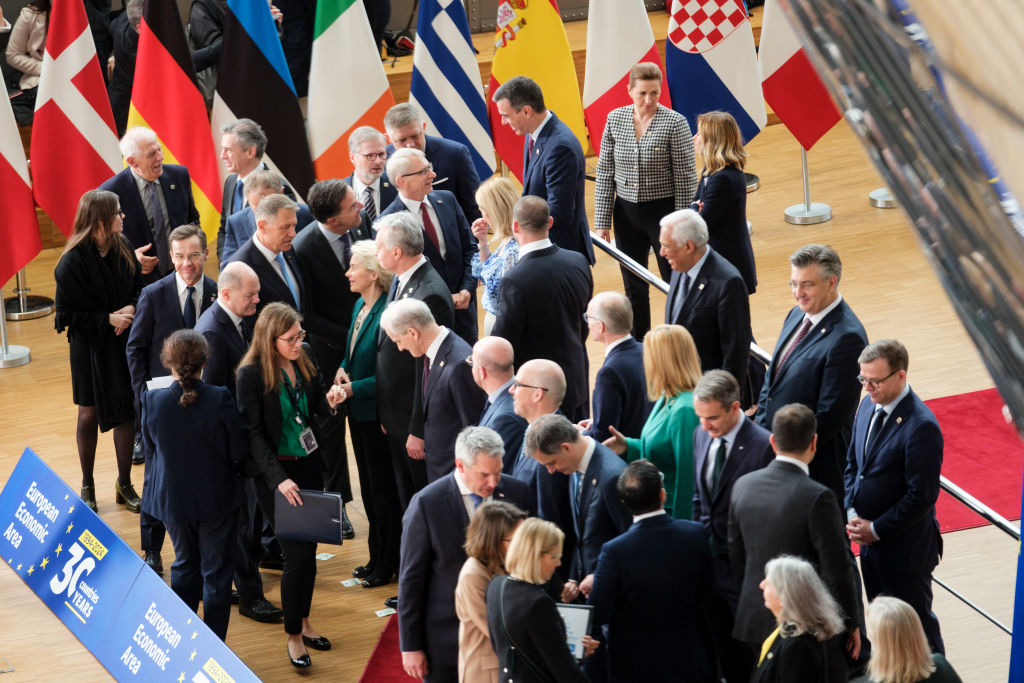Ever since Donald Trump arrived on the world stage, liberal internationalists have thrown one particular insult his way: “Isolationist!” Kaja Kallas, the European Union’s representative on foreign affairs, attempted to give Americans a history lesson on their own country by lecturing that isolationism – her idea of Trump’s policies – “never worked well for America.” Just weeks ago, Bloomberg’s Brussels team declared that the “EU backs global engagement against Trump’s isolationism.” And just recently, a hit piece ran on Trump’s Under Secretary of Defense for Policy, Elbridge Colby, after Colby temporarily blocked shipments of weaponry to Ukraine. In the piece, an anonymous official smeared Colby as having “decided that he’s going to be the intellectual driving force behind a kind of neo-isolationism that believes that the United States should act more alone, that allies and friends are kind of encumbering.”
The issue with all of this is that it’s simply not isolationist. Isolationism is quite rare and involves truly closing oneself off from the world: pulling all troops home, closing off trade, and effectively making one’s country “isolated” in all respects.
But these policies are something else: nationalism. Italian Prime Minister Giorgia Meloni described her views as “patriotism”, shying away from the term “nationalism”, but President Trump has gone further in declaring himself a nationalist. Nationalism is simply putting one’s country first (as Trump’s refrain of “America first” demonstrates). It does not require the closing off of one’s country; plenty of nationalists have had allies and have made trade deals.
Apply this line of thought to Colby. Colby frustrated Europeans by blocking shipments of Patriot missiles to Ukraine due to a concern that American stocks were running low. This is, on its face, entirely reasonable: Patriots take a long time to produce, and America currently only has about 25 per cent of the Patriot missiles the Pentagon believes are necessary for America’s interests. This is militarily disastrous: The per cent of necessary Patriot missiles, a key defensive system, that America should have is 100 per cent, not 25.
Colby also reportedly offended the British by reportedly telling them that they should send their aircraft carrier, the HMS Prince of Wales, back out of the Pacific, specifically saying, “We don’t want you there.” This has been portrayed as a disastrously rude breach of protocol.
But he is also…correct? The time for the British to play empire ended at Suez. Since the Russo-Ukrainian War expanded in 2022, Britain’s four prime ministers have made a big show of defending Ukraine. If so, they should be putting their focus there; deal with Russia, the threat to Europe. America can deal with China.
These two events hint of course at the real reason European leadership is upset with Colby and the Trump administration: Because these actions are forcing them to do more while America moves its focus away from Europe to focus on its own interests.
Consider Colby’s previous actions and statements. He has long supported blocking Chinese expansionism and influence, including the placement of American troops in Asia. That is not isolationism. It is, quite literally, the opposite of isolationism. What it is is realism: Recognising the world as it is and reacting as necessary in order to protect one’s national interests. Liberal democracy requires one to act to propel a certain ideology forward (communism is likewise). Isolationism is foreign policy-by-ideology as well.
But realism is different. And it goes hand-in-hand with nationalism, a term many – including Meloni – have been hesitant to embrace for historic reasons. But nationalism, and realism, is not just crucial for those who support their countries. It is also central to the story of America itself.
Upon his leaving office, George Washington warned his countrymen against becoming entangled in permanent alliances, specifically with Europe, asking, “Why, by interweaving our destiny with that of any part of Europe, entangle our peace and prosperity in the toils of European ambition, rivalship, interest, humour, or caprice?” He went on to make clear that perhaps sometimes temporary alliances would be necessary but declared “in my opinion it is unnecessary and would be unwise to extend them.”
This was not a minority view in America. It was effectively its default for most of the country’s existence. Only in the early 20th century did that change, putting paid to Kallas’ absurd idea that these ideas – what she wrongfully smears as isolationism – “never worked well for America.” Washington’s ideas, which were not isolationist, literally built America into the power that it was by the end of the 19th century. Thomas Jefferson, America’s third president, still took action abroad, sending ships to settle the problem posed by the Barbary pirates. And Andrew Jackson threatened it when he believed it might be necessary, as did others.
Which highlights the particular problem with the “Isolationist!” whine: the ideology of “isolationism” does not really exist in any practical sense. Washington, like Jefferson and Jackson, did not believe that America should be, by default, “isolated”. Washington was happy to speak with, engage with, trade with, and work with other nations. He simply did not want to become responsible for their problems. Because Washington was a nationalist, who cared first and foremost for the American nation.
Europeans who cry “Isolationist!” are doing so because they need America to become involved in their problems – or, as Washington put it, their “ambition, rivalship, interest, humour, or caprice.”
America is far from acting isolationist. Secretary of State Marco Rubio just embarked on his first Asia tour this week, President Trump just met with Israeli Prime Minister Benjamin Netanyahu and bombed Iran, and the globe is still dotted with American bases. America is getting involved with problems that face Americans. The Trump administration believes that China is a far greater threat than is Russia. As a result, it’s pivoting to Asia – and it’s done getting involved in Europe’s affairs.
The quicker Brussels figures that out, the better off they’ll be.





Want to exercise freedom of speech? Not when European lawfare cuts your throat